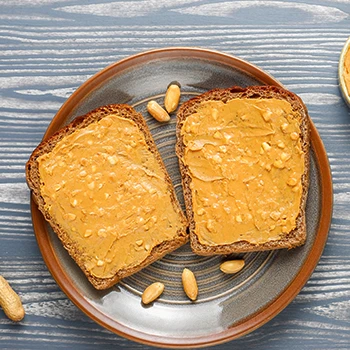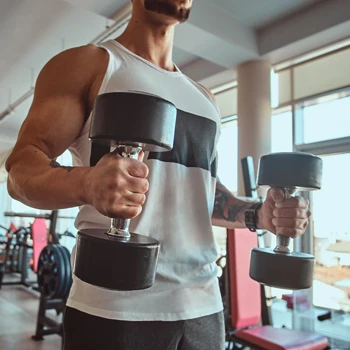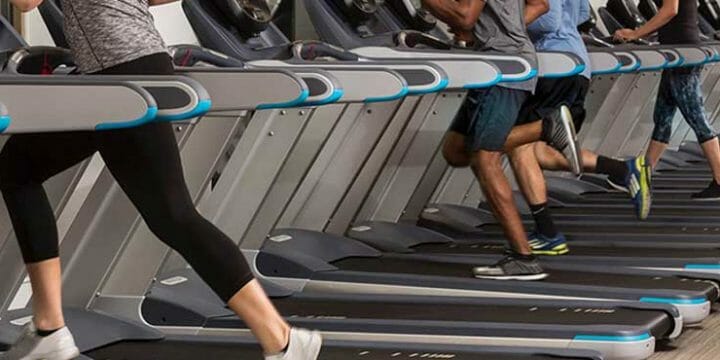A pre-workout meal is intended to raise your glucose and sugar levels as you'll have more energy and then exercise effectively for extended periods.
Being a huge fan of peanut butter in general, I’ve always wondered whether this delicious snack could be used as a pre-workout meal.
As a certified personal trainer, I worked together with a team of dieticians to get to know the nutritional importance of peanut butter and whether it can be considered a great pre-workout snack or not.
This is what I found.
Quick Summary
- To enhance gym performance and sustain energy during workouts, incorporating peanut butter as a pre-workout snack is beneficial due to its rich protein and carbohydrate content.
- Peanut butter, consumed 30-45 minutes before exercise, continues to provide nutritional benefits even after the workout, making it an effective pre- and post-workout food.
- Each serving of peanut butter contains 0.17g of vitamin b-6, over 14% of an adult's recommended dietary allowance of 1.3mg, as noted by MedicalNewsToday, highlighting its role in supporting over 100 enzyme physiological functions and benefiting heart and central nervous system function.
- In my experience, peanut butter is a versatile and nutrient-dense choice for fitness enthusiasts looking for a natural and satisfying pre-workout snack.
Peanut Butter As A Pre-workout Snack

If you've been in the fitness world long enough, you can agree that consuming protein and carbohydrates before an exercise is good.
From my own training routine, I can vouch that peanut butter is an excellent pre-workout snack. Its rich protein and carbohydrate content give me the necessary fuel and energy boost for effective exercise sessions.
If you eat it 30-45 minutes before your workout, your body will continue to use those nutrients from that peanut sandwich even after your training session; therefore, it's a good post-workout as well [1].
Incorporating healthy fats like eating peanut butter into your post-workout meal is essential for optimal recovery.
You can fuel muscle growth, enhance recovery, and achieve your fitness goals with peanut butter in your well-balanced post-workout meal.
For an even smoother and faster workout and weight loss experience, we recommend combining this protein-packed spread with some of the best organic pre-workouts to sweat more and get the most out of your training session.
Peanut Butter Nutrition Profile

This butter is a protein-rich spread that is popular all over the globe. It's made with roasted ground peanuts that are mixed into a puree.
The finished product contains a variety of nutrient content that comes with great health benefits [2].
Peanut butter consists of the following nutrients:
- Protein: PB has around 35% protein, making it a rich plant-based lean protein supply. Each serving contains 9g of protein.
- Carbohydrate: PB has a low carb content. The carbohydrates per serving of peanuts contribute to approximately 13 to 16% of the overall weight, resulting in a Glycemic index of 14.
- B-6 vitamin: PB contains 0.17 g of vitamin B-6 per serving, which is over 14 % of an adult's recommended dietary allowance of 1.3 mg. According to one of the studies from the MedicalNewsToday website, vitamins like B-6 fuel more than 100 enzyme physiological functions and can also benefit heart and central nervous system function [3].
- Fats: 2 tablespoons of PB has 3.3g and 12.3 g of saturated and unsaturated fats respectively. According to a study from the Harvard Health Publishing website, these healthy fats can help reduce the risk of developing type 2 diabetes and heart disease [4].
- Magnesium: Each peanut serving contains 57 mg of magnesium, contributing to the recommended daily amounts (RDA) of 400-420 mg quantity for males and 310-320 mg for women [5]. This nutrient also found in a banana is necessary to maintain good health since it helps in several biochemical activities in your stomach.
"Peanut butter foods are nutrient-dense, meaning they pack a powerful nutritional punch in every bite."
-Leslie J. Bonci, MPH
Peanut Butter and Your Fitness Goals

Here are the other great benefits of peanut butter that will help you reach fitness goals faster.
Helps With Weight Loss
Incorporating peanut butter into my diet has contributed to my weight loss journey. Its combination of protein, carbohydrates, healthy fats, and fiber has helped me feel fuller for longer and maintain a balanced diet while shedding pounds.
As a result, eating peanut butter sandwich bread combined with a regular workout plan will help you attain your objectives faster by making you feel heavy and fuller for longer.
This keeps hunger at bay while burning more fat and calories when working out.
Stronger Muscles and Nerves
Magnesium in peanuts has been shown to help treat headaches, aids muscle recovery and beats weariness [6].
PB is a rich supply of this nutrient, with one two-tablespoon meal providing roughly 15% of your recommended dietary allowance.
Peanut Butter Preserves Muscular Mass

Bulk muscular mass preservation and endurance are critical during the process of losing weight.
If you're starting your weight loss journey and are on a low-protein diet, you'll likely experience some muscle loss that can drastically lower your metabolic and digestion rate.
It also aids in weight maintenance as well as kidney health [7].
Peanut Butter Lowers The Risk of Heart Disease
Resveratrol, an antioxidant found in peanuts, has been shown to decrease cardiovascular irritation, drop blood pressure, enhance circulation, and calm veins and arteries [8].
Cons Of Peanut Butter as a Pre-workout

Despite the incredible health benefits that a spoon of peanut spread gives you, it has its disadvantages as a pre-workout. These are:
- As someone who closely monitors my calorie intake, I'm aware that peanut butter is calorie-dense, with about 180 calories in two tablespoons. This knowledge helps me enjoy it in moderation, ensuring I get its benefits without overindulging. As a typical binge food for dieting individuals, the extra calories, fats, and no workouts could lead to weight gain.
- Peanut butter allergies are the second most common food allergies. If you're allergic to peanuts, eating nut butter could cause life-threatening issues as far as allergic reactions are concerned [9]. It would be best to substitute PB for almond butter or different nut butter.
- In addition to allergic reactions, eating excess peanut butter nutrition amounts can cause your stomach to develop an intolerance to it. If you ate peanut butter and experienced anything weird, it would be best to get your blood work done to check for any signs of peanut intolerance.
- Peanut butter jam lacks vitamin C minerals, which your body needs to produce collagen, a building element of bones, tendons, and ligaments, particularly for bodybuilders.
Related Articles:
FAQs
Does Peanut Butter Help With Gym Performance?
Yes, peanut butter helps with gym performance due to its protein and carbohydrate content, which are essential for muscle building.
When Should You Eat Peanut Butter Before a Workout?
You should eat peanut butter 30-45 minutes before a workout to allow time for protein breakdown and absorption, aiding in muscle support.
Is Peanut Butter Good For Abs?
Yes, peanut butter is good for abs, as its protein content supports muscle growth in the abdominal area.
Is Peanut Butter Good Before Running?
Yes, peanut butter is good before running, providing the proteins and energy necessary for sustaining a strenuous running session.
How Does Peanut Butter Compare to Other Popular Pre-Workout Snacks in Terms of Energy and Protein Content?
Peanut butter, with its high protein and healthy fat content, offers sustained energy and aids muscle recovery, making it superior to other snacks that may lack this balanced nutritional profile.
What Are the Nutritional Differences Between Natural, Organic, and Processed Peanut Butter?
Natural and organic peanut butter typically have more beneficial nutrients and fewer additives compared to processed peanut butter, which often contains added sugars and hydrogenated fats.
How Does Peanut Butter Fit Into Various Dietary Restrictions Like Keto, Paleo, or Gluten-Free?
Peanut butter fits well into keto and gluten-free diets due to its low-carb, high-fat content, but for paleo diets, choosing natural peanut butter without added sugars or hydrogenated oils is important.
Can You Suggest Some Creative Ways to Incorporate Peanut Butter in Pre-Workout Meals?
Creative ways to incorporate peanut butter in pre-workout meals include adding it to smoothies, oatmeal, or whole-grain toast with banana slices, providing a balanced mix of protein, healthy fats, and carbohydrates.
References:
- https://www.livestrong.com/article/522677
- https://www.healthline.com/nutrition/is-peanut-butter-bad-for-you#protein
- https://www.medicalnewstoday.com/articles/219662#
- https://www.health.harvard.edu/nutrition/ask-the-doctor-why-is-peanut-butter-healthy-if-it-has-saturated-fat
- https://www.hsph.harvard.edu/nutritionsource/magnesium/#
- https://www.thejoint.com/utah/sandy/sandy-45003/
- https://www.health.harvard.edu/nutrition/ask-the-doctor-why-is-peanut-butter-healthy-if-it-has-saturated-fat
- https://www.webmd.com/diet/peanut-butter-good-for-you
- https://www.slhd.nsw.gov.au/rpa/allergy/resources/allergy/peanutallergy.pdf
About The Author
You May Also Like






